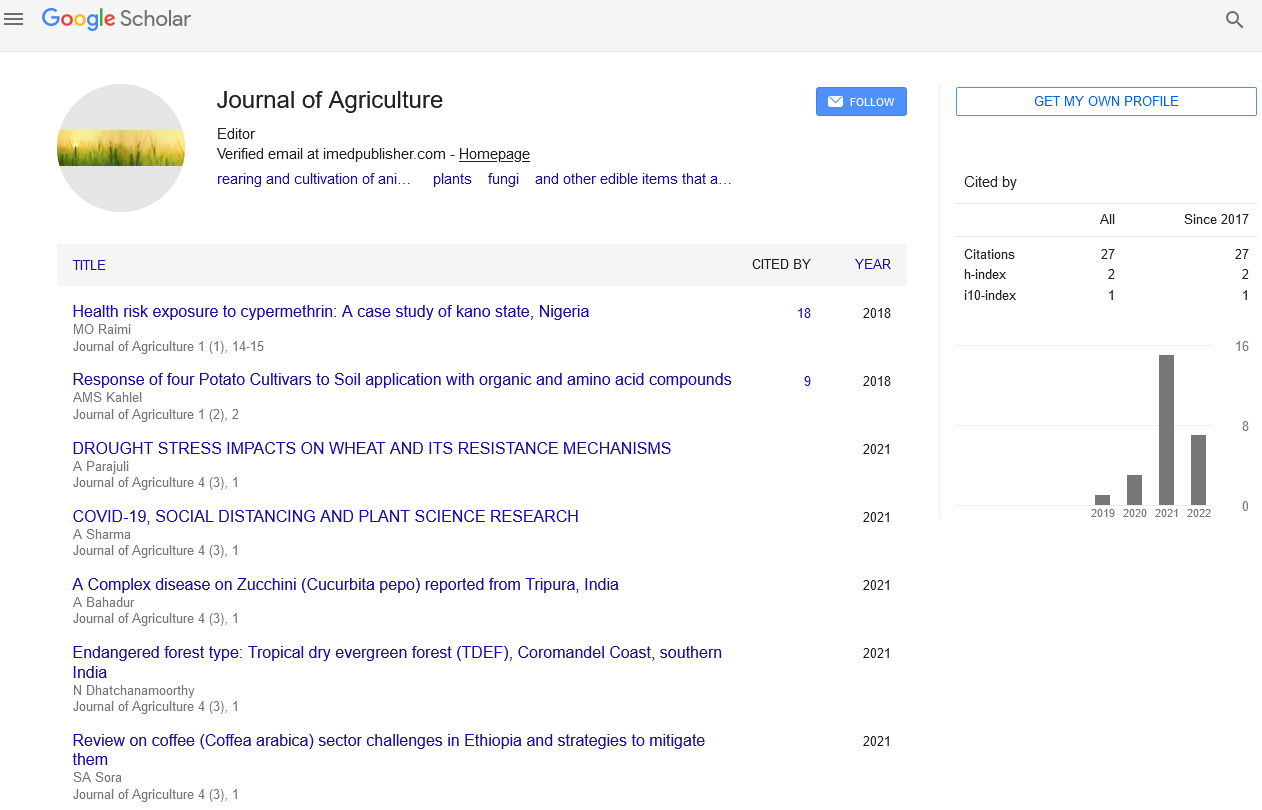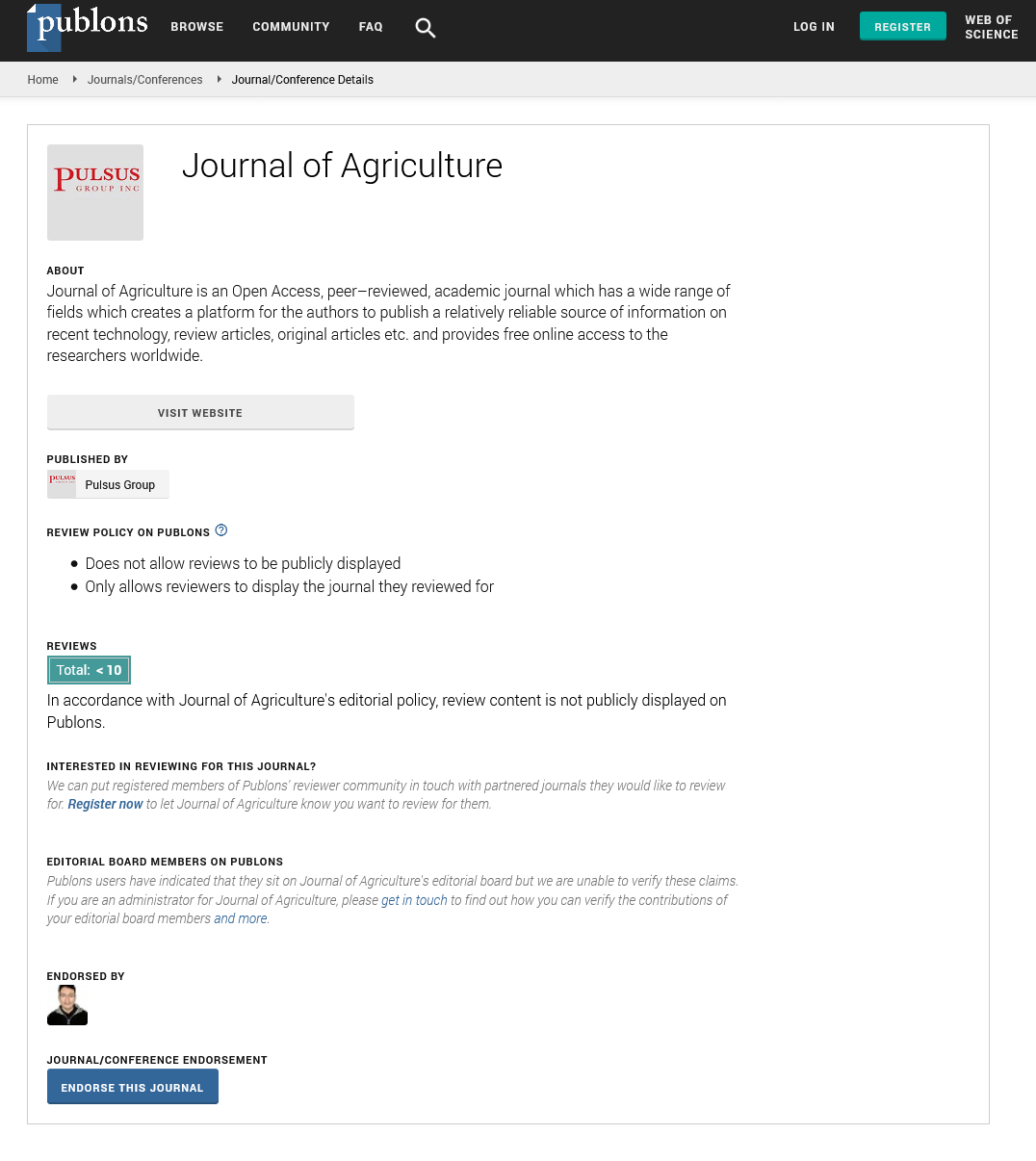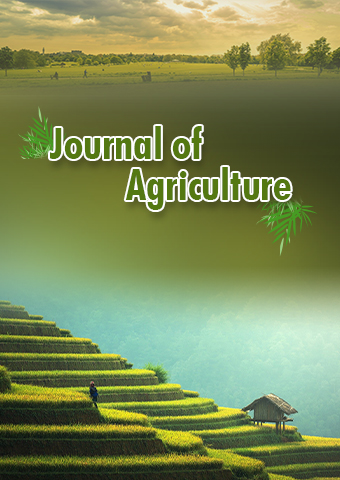Editorial - Journal of Agriculture (2023) Volume 6, Issue 4
Aquaculture: A Sustainable Solution for Fish Cultivation and Global Food Security
Kristofor Brye*
Department of Biological Systems Engineering, University of Nebraska-Lincoln, USA
Department of Biological Systems Engineering, University of Nebraska-Lincoln, USA
E-mail: Bkristofor3@gmail.com
Received: 01-Aug -2023, Manuscript No. jagri-23- 108481; Editor assigned: 03- Aug-2023, Pre-QC No. jagri-23-108481 (PQ); Reviewed: 17- Aug-2023, QC No. jagri-23-108481; Revised: 22-Aug-2023, Manuscript No. jagri-23- 108481 (R); Published: 29- Aug-2023; DOI: 10.37532/ jagri.2023.6(4).91-93
Abstract
As the world faces escalating challenges related to population growth, climate change, and diminishing natural resources, ensuring global food security has become an urgent priority. One vital aspect of this challenge is meeting the growing demand for highquality protein sources, with fish being an essential component of the human diet. To address this concern, aquaculture has emerged as a promising and sustainable solution for fish cultivation, offering a range of benefits for both the environment and food security. Aquaculture, also known as fish farming, involves the controlled cultivation and harvesting of various aquatic organisms in a managed environment. This practice has gained popularity in recent years due to its potential to alleviate pressure on wild fish stocks, reduce overfishing, and mitigate the negative environmental impacts associated with traditional fishing practices. This abstract examines the multifaceted advantages of aquaculture as a means of ensuring global food security. Firstly, aquaculture provides a reliable and consistent supply of fish, reducing dependence on unpredictable catches from natural ecosystems. It contributes to food security by offering a stable and sustainable protein source, essential for the nutrition and well-being of people worldwide. Aquaculture promotes economic growth and livelihood opportunities, particularly in rural and coastal communities where fish farming becomes a primary source of income. By generating employment and supporting local economies aquaculture can alleviate poverty and improve overall socio-economic conditions. the environmental benefits of aquaculture are significant. Sustainable aquaculture practices can be designed to minimize habitat destruction, water pollution, and by catch, thus preserving marine ecosystems and biodiversity. Additionally, advances in technology and research enable the development of eco-friendly aquaculture systems, further reducing the industry’s ecological footprint. Furthermore, the potential for innovation in aquaculture is vast, with ongoing research focused on improving feed efficiency, disease prevention, and waste management. These advancements aim to optimize resource utilization, minimize environmental impacts, and increase the productivity of fish farms, thus enhancing food security on a global scale.
Keywords
Food security • Aquaculture systems • Water pollution • Fish cultivation • Economies
Introduction
Aquaculture, often referred to as fish farming, is the practice of cultivating various aquatic organisms under controlled conditions. This rapidly expanding industry plays a crucial role in meeting the rising global demand for seafood, alleviating pressure on wild fish stocks, and addressing food security challenges [1]. As the world’s population continues to grow, sustainable fish farming is becoming increasingly vital to ensure a steady supply of nutritious protein sources. This article explores the significance of aquaculture, its environmental impacts, and the strides made towards developing a sustainable future for fish cultivation [2]. Challenges persist in the adoption of sustainable aquaculture practices, including the responsible use of antibiotics, potential impacts on local ecosystems, and land and water use conflicts. To ensure the success of aquaculture as a sustainable solution, appropriate policies, regulations, and international cooperation are necessary to address these challenges effectively [3]. Aquaculture represents a viable and sustainable solution for fish cultivation and plays a crucial role in achieving global food security. By fostering responsible practices, promoting innovation, and addressing potential challenges, aquaculture can contribute significantly to meeting the nutritional needs of a growing global population while safeguarding marine ecosystems for future generations [4]. It is essential for governments, businesses, and communities to collaborate in harnessing the full potential of aquaculture to create a more foodsecure and environmentally sustainable future.
A growing demand for sustainable protein sources
The global population is projected to reach 9.7 billion by 2050, necessitating a substantial increase in food production. As a highly nutritious protein source, fish and seafood have become an integral part of people’s diets worldwide. However, overfishing and habitat destruction have severely depleted wild fish stocks, making it essential to find alternative solutions to meet the rising demand for fish. Aquaculture has emerged as a sustainable approach to bridge this gap, offering opportunities for responsible fish production while preserving marine ecosystems [5,6].
Benefits of aquaculture
Aquaculture offers numerous advantages over traditional fishing methods. By controlling breeding and feeding conditions, fish farmers can ensure consistent production, reducing the pressure on wild fish populations. Additionally, aquaculture facilities provide a controlled environment that minimizes exposure to contaminants and diseases, resulting in healthier fish products [7]. Furthermore, fish farming supports local economies, creating employment opportunities and fostering economic growth in coastal regions.
Environmental concerns and sustainability measures
While aquaculture presents a sustainable alternative to overfishing, it also poses certain environmental challenges. Poorly managed fish farms can lead to habitat degradation, water pollution, and the spread of diseases to wild populations. To address these concerns, the aquaculture industry is continually evolving with a focus on sustainability [8]. Innovations in recirculating aquaculture systems (RAS) help conserve water and reduce waste, while responsible farm siting and improved waste management mitigate environmental impacts. Additionally, advances in fish nutrition and selective breeding contribute to healthier fish that require fewer resources to grow.
Embracing responsible aquaculture practices
Promoting responsible aquaculture practices is vital to ensuring the long-term sustainability of this industry. Governments, international organizations, and aquaculture producers are collaborating to establish stringent regulations and certifications that uphold environmental and social standards. Consumers can also play a pivotal role by supporting sustainably produced fish products, encouraging responsible practices across the supply chain [9].
Aquaculture and the circular economy
As the concept of circular economy gains traction, aquaculture plays a significant role in its implementation. By-products from fish processing and aquaculture operations can be repurposed into valuable resources such as fishmeal and fish oil, reducing waste and maximizing resource efficiency. This circular approach not only minimizes environmental impact but also creates a more economically viable and resilient industry [10].
Conclusion
Aquaculture, the practice of fish cultivation, represents a crucial solution to meet the increasing global demand for seafood sustainably. By adhering to responsible and ecofriendly practices, the aquaculture industry can alleviate pressure on wild fish stocks, mitigate environmental impacts, and contribute to global food security. As consumers, businesses, and governments unite to support and develop sustainable aquaculture, we can build a resilient future that nourishes both people and the planet.
References
- Ogello EO, Mlingi FT, Nyonje BM et al. Can integrated livestock-fish culture be a solution to East Afircan's food insecurity? A Review.African J Food Agric Nutr Dev.13 (4), 8058-8078 (2013).
- Ogello EO, JM Munguti. Aquaculture: a promising solution for food insecurity, poverty and malnutrition in Kenya.African J Food Agric Nutr Dev.16(4), 11331-11350 (2016).
- Nesar A, Thompson S, Giovanni M. Organic aquaculture productivity, environmental sustainability, and food security: insights from organic agriculture.Food Security.12, 1253-1267 (2020).
- Nesar A, Giovanni M, Turchini J. The evolution of the blue-green revolution of rice-fish cultivation for sustainable food production.Sustain Sci. 16(4), 1375-1390(2021).
- Jennings L, Simon M. Aquatic food security: insights into challenges and solutions from an analysis of interactions between fisheries, aquaculture, food safety, human health, fish and human welfare, economy and environment.Fish Fish. 17(4), 893-938 (2016).
- Ahmed N, Luong-V J. Can rice-fish farming provide food security in Bangladesh. Aquac Asia. 16, 12- 23 (2009).
- Delgado CL, Wada N, Rosegrant MW et al. Outlook for fish to 2020: meeting global demand. Intl food policy res inst.15, (2003).
- Kiran P, Adi J. Aquaculture role in global food security with nutritional value: a review.TranslAnimSci. 3(2), 903-910 (2019).
- Reverter M, Sarter S, Caruso D, Avarre JC. Aquaculture at the crossroads of global warming and antimicrobial resistance. NatCommun.11(1), 1870-1879 (2020).
- Asiedu K, Berchie FKE, Iddrisu S et al. Prospects and sustainability of aquaculture development in Ghana, West Africa.Cogent Food & Agricultur.3(1), 1349531 (2017).
Indexed at, Google Scholar, Crossref
Indexed at, Google Scholar, Crossref
Indexed at, Google Scholar, Crossref


